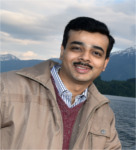
On the 12th of February The Max Foundation and Friends of Max organised our 3-monthly GIST meet at the Tata Memorial Hospital.
We had a special invitee to the meet, Mr. Markus Wartenberg director of SPAEN (Sarcoma Patients EuroNet Association), the European Network of Sarcoma, GIST and Desmoid Patient Advocacy Groups. The meet was organised by Viji Venkatesh with the guiding force of Dr. Vikas Ostwal, Oncologist Tata Memorial Hospital. Around 40 people attended the meet.
After the national anthem and the initial welcome by Viji Venkatesh, I, a GIST survivor and a Friends of Max Volunteer, welcomed and introduced the guest speaker Mr. Markus Wartenberg, who delivered a very informative and comprehensive talk on the role of his organisation and the status of GIST support, treatment and research in Germany. Below is the sum of Mr. Markus’s talk.
There are around 1000 new GIST patients diagnosed in Germany every year. He stated the role of Patient Advocacy groups as:
1. Providing support to the patient one on one.
2. Advocacy: Raising the voice together for a common cause of all patients to the concerned authorities.
He stressed that GIST being a rare cancer it is important to direct the patient to a GIST specialty centre for the best diagnosis and treatment.
He talked about his organisation Das Lebenhaus, as having a multidisciplinary Medical Board, which accounts for proper patient education, treatment and care as well as clinical research. This eventually leads to improving the survival of patients. His organisation, along with medical colleges, organises many conferences and supports new drug trials for GIST across the world.
He stated the success factors for an Advocacy Group as:
1. Vital active leaders
2. Clear philosophy
3. Healthy financial basis
4. Medical knowledge in research.
5. Marketing skills
6. Tie-ups with pharma companies.
7. Local and international networking to improve cooperation between GIST support groups.
This was followed by my presentation where I gave a brief overview of work done by the Max Foundation for GIST support in India.
Max foundation has over 600 registered GIST patients in India. They have 12 meetings in a year for GIST and CML patients across India. These meetings involve physician’s talks, question and answer sessions, as well as workshops like Art therapy and Drama therapy.
These meetings bring together patients and caregivers from various corners of the country, and the exchange of views and ideas opens up different possibilities. We also gain immense strength from each other and help one another to maintain compliance in taking the drug and managing the side effects effectively.
I applauded the role of Tata Hospital doctors in leading in all fields for bettering GIST treatment and research in India.
I emphasised the need for creating a platform whereby European and Indian GIST specialists meet one on one to exchange information and update each other on the current trends in treatment for GIST. This will lead to a better understanding of GIST treatment options and will improve care for GIST for patients on a global scale.
The website for GIST support https://friendsofmax.info/default/fom-gisters which was launched in July 2014 was shown and highlighted. On behalf of FOM, I thanked Dr. Vikas Ostwal and Dr. Shailesh Shrikhande for their support regarding the same.
The last part of the meet was the question and answer session headed by Dr Vikas Ostwal and Mr. Markus Wartenberg, where they patiently listened and answered the questions of the patients. Some of them were:
1. Is GIST curable – where the talk ranged from localised lesion to metastatic lesion and also to resistant GIST. So depending on the case GIST can be cured or managed as a chronic disease.
2. Financial support for the treatment of GIST – which involved organisations like Max Foundation, V Care and others who support the cause.
3. Follow-up – ranged from routine blood test, sonography, CT scans to sophisticated PET Scans as advised by the doctor, specific to each case.
4. Diet – where patients were advised to lead a life of moderation, eat a healthy nutritious diet, exercise, and most importantly lead a positive and active life. They were advised against opting for sudden drastic changes in diet and resorting to nutritional supplements as advised by some commercial organisations.
5. Exposure to radiation or harmful chemicals, if any, at work place was to be avoided.
We then thanked Mrs. Vandana Gupta, founder of the V Care Foundation for her presence and support at the event.
The meeting ended with group photos as they are important tools for recording events. It was followed by tea and snacks.
By –
Dr. Nikhil Guhagarkar, FOM Volunteer, Mumbai

